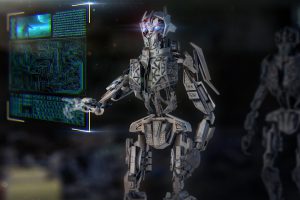Artificial Intelligence (AI) has emerged as a transformative force, reshaping industries and fundamentally altering the way we work. As AI technologies continue to advance, their impact on future careers is becoming increasingly significant. In this blog, we’ll delve into the profound changes AI is bringing to the job landscape, explore the evolving skill sets required, and discuss how individuals can navigate the future of work in an AI-driven world.
- Automation and Job Disruption
One of the most immediate impacts of AI on future careers is the automation of routine tasks. AI-powered systems and robots are increasingly capable of performing repetitive and rule-based jobs, affecting industries such as manufacturing, logistics, and customer service. While this automation leads to increased efficiency and cost savings for businesses, it also raises concerns about job displacement.
Routine tasks that involve manual labor or data processing are susceptible to automation, prompting individuals to upskill and adapt to roles that require a higher degree of creativity, critical thinking, and emotional intelligence.
- Rise of AI-Enhanced Jobs
While certain roles may be automated, AI is also creating new opportunities and augmenting existing jobs. The demand for professionals who can work alongside AI systems, interpret data, and leverage AI tools for decision-making is growing. Fields such as data science, machine learning, and AI development are witnessing increased demand for skilled individuals.
- Skill Evolution: The Need for Digital Literacy
As AI becomes more ingrained in workplaces, there is a growing demand for digital literacy and technical skills. Individuals need to adapt and acquire expertise in areas such as data analysis, coding, and machine learning. Beyond technical skills, there is an increasing emphasis on soft skills like adaptability, critical thinking, and problem-solving, which are crucial for roles that involve collaboration with AI systems.
- Personalization in Career Development
AI is also influencing how individuals approach career development. Personalized learning platforms and AI-driven career coaches are becoming more prevalent, offering tailored advice and recommendations based on an individual’s skills, preferences, and career goals. This personalized approach enhances the effectiveness of professional development, helping individuals make informed decisions about their career paths.
- Ethical Considerations and AI Governance in Careers
The increasing integration of AI in the workforce raises ethical considerations and the need for robust governance frameworks. As AI systems influence hiring decisions, employee evaluations, and other aspects of the employment lifecycle, ensuring fairness, transparency, and accountability becomes crucial. Professionals in the future job market will likely see the emergence of roles focused on AI ethics and governance.
Conclusion
The impact of artificial intelligence on future careers is profound, presenting both challenges and opportunities. As automation reshapes certain job functions, new roles are emerging, demanding a diverse set of skills encompassing technical expertise, soft skills, and adaptability. Navigating the future of work in an AI-driven world requires a proactive approach to skill development, continuous learning, and a keen awareness of ethical considerations.
While AI brings about changes in the employment landscape, it also opens up avenues for innovation, personalized career development, and the creation of roles that prioritize ethical governance. By staying informed, embracing digital literacy, and cultivating a mindset of adaptability, individuals can position themselves for success in the dynamic and evolving job market shaped by artificial intelligence.











